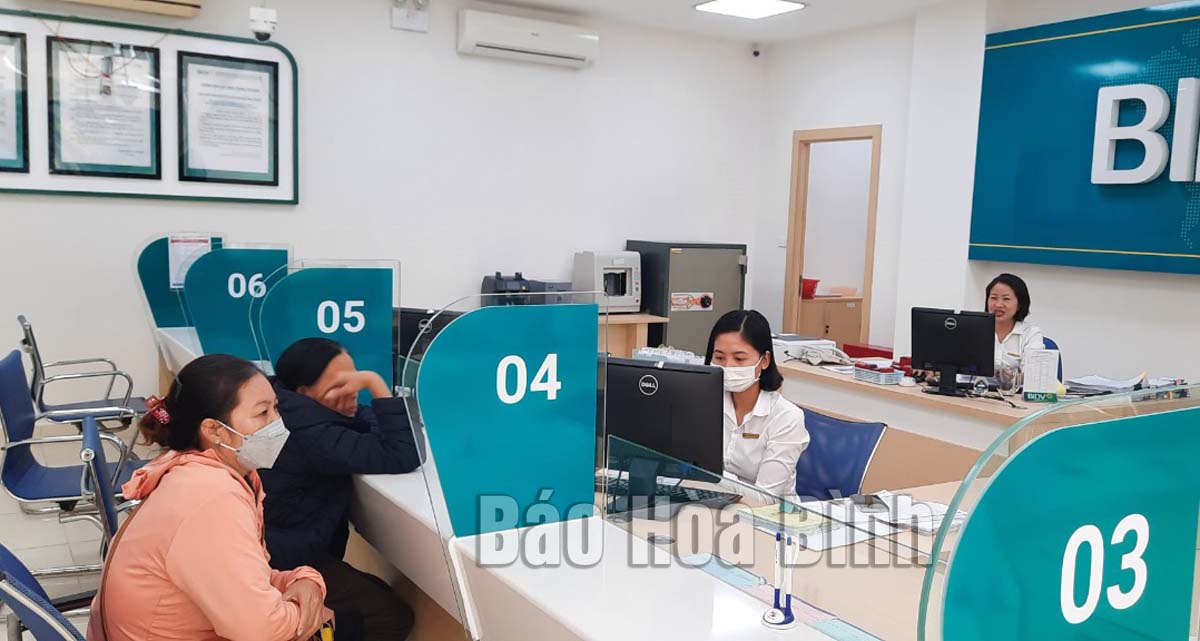
(HBO) - On March 27, 2017, the Standing Board of the Party Committee of the provincial Agencies’ Bloc issued Resolution No. 08-NQ/DU on reforming the ideological work, and preventing self-evolution and self-transformation among the Party members, focusing on leading and directing Party organisations, officials and members to seriously implement it, thus creating changes in political thought, morality, lifestyle, attitude, and responsibility to set example of officials and Party members, according to Nguyen Duc Cuong, Secretary of the Party Committee of the provincial Agencies’ Bloc.

Over the past years, Party organisations in the
banking sector have focused on leading the units to improve the quality of
serving businesses and people. (Photo taken at BIDV Hoa Binh).
As of August 2022, the Bloc Party Committee had 73 Party
grassroots organisations (including 46 Party organisations and 27 cells) with
4,240 members. After promulgating the resolution, the Bloc Party Committee and
the Party committees have led and directed the implementation of the resolution
in association with realising documents of the Party Central Committee and
provincial Party Committee on building and rectifying the Party and promoting
the learning and following of President Ho Chi Minh's ideology, morality and
lifestyle.
The Bloc Party Committee and its subordinates have
introduced the contents of learning, raising awareness, fighting, and repelling
the degradation of political ideology, morality, lifestyle, and expressions of
self-evolution and self-transformation to the activities of the Party Committee
and Party cells; and strictly implemented the principle of self-criticism and
criticism in committees and cells at all levels.
After five years implementing the resolution, activities of
Party committees have been increasingly innovative and effective.
Socio-political organisations have reported many positive changes. The
pioneering role, and responsibility of setting an example of officials and
Party members, and the level of political theory have been enhanced, thus
creating positive changes in the fields of politics, ideology, morality,
lifestyle, and behaviour./.
Hoa Binh province is undergoing a dynamic transformation amid Vietnam’s national digital transition. Building on Poliburo’s Resolution No. 57-NQ/TW on breakthroughs in science, technology, innovation, and national digital transformation, the province has rolled out a wide range of practical action plans. A standout initiative is the "Digital Literacy for All” movement, an effort to ensure that no one is left behind in the digital era.
Hoa Binh province is undergoing a dynamic transformation in the wake of the national digital transformation movement. Building on Resolution No. 57-NQ/TW of the Politburo on breakthroughs in science, technology, innovation, and national digital transformation, the province has implemented a wide range of practical action plans. A standout initiative is the "Digital Literacy for All” movement ambitious effort to ensure that no one is left behind in the digital age.
With a spirit of unity and proactive problem-solving, the Party Committee, the government and the people of Dong Lai Commune (Tan Lac District) have made great strides in implementing the resolutions of the 24th Party Congress of the commune for the 2020 - 2025 term. Focusing on leadership and practical actions, the commune has brought the Party’s resolutions into daily life, creating strong impacts and pushing the local development forward.
Amid the nationwide push for digital transformation, young people in Hoa Binh Province are stepping up as dynamic pioneers, applying technology to enhance Youth Union operations and expand the reach of youth-led initiatives. Through creativity and adaptability, Youth Union organizations at all levels have introduced a series of practical solutions, contributing to modern governance and community development.
In recent years, An Nghia commune, located in Lac Son district, has stepped up administrative reform, focusing on improving the quality and efficiency of its single-window service unit for receiving and processing administrative procedures. These improvements have helped create favourable conditions for local residents and organisations to handle administrative procedures, contributing to the commune’s broader socio-economic development.
The Prime Minister-approved master plan to develop the multi-use value of forests ecosystems through 2030, with a vision to 2050, aims to improve the management and sustainable use of forest resources, create jobs, increase incomes, and improve the living standards of ethnic minorities, people in mountainous and remote areas, forest workers and those living near forests.



